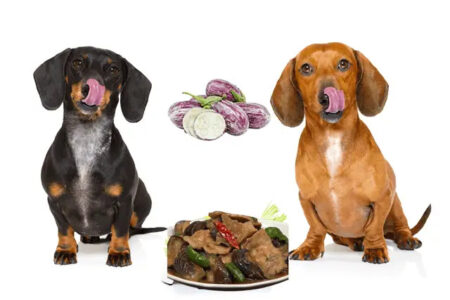Can Dogs Eat Eggplant?
Eggplant is a popular vegetable in many households as it is tasty, versatile, and good for health. However, for dog owners, it is important to know if this vegetable is safe for their furry friend to consume. In this article, we will discuss whether dogs can eat eggplant and the potential health benefits and risks associated with it.
Can Dogs Eat Eggplant?
The short answer is yes, dogs can eat eggplant. It is not toxic or harmful to dogs when consumed in moderation. Eggplant contains various nutrients such as vitamins, minerals, and fiber, which can be beneficial for dogs. However, it is important to take some precautions when feeding eggplant to dogs.
What Is Eggplant?
Eggplant is a vegetable known for its purple color and unique shape. It is also known as aubergine or brinjal in different parts of the world. It is a member of the nightshade family, which also includes tomatoes, potatoes, and peppers. Eggplant has a firm and glossy skin and a spongy flesh with small edible seeds. It has a slightly bitter taste and is commonly used in various cuisines, such as Mediterranean, Asian, and Middle Eastern. It can be cooked in a variety of ways, including grilling, roasting, frying, or baking. It is a low-calorie, nutrient-dense vegetable and is a good source of fiber, vitamins, and minerals.
Can Dogs Eat Eggplant Seeds
It is not recommended to give your dog eggplant seeds. While the seeds themselves are not toxic, they can pose a choking hazard or cause digestive upset if ingested in large quantities. It is best to remove the seeds before giving eggplant to your dog. Additionally, some dogs may have a sensitivity to eggplant or other members of the nightshade family, so it is important to monitor your dog for any signs of an adverse reaction after consuming eggplant. If you have any concerns, consult your veterinarian before giving your dog eggplant.
How Many Eggplants Can I Give to My Dog?
It is not recommended to give eggplants to your dog in large quantities. While small amounts of cooked eggplant are not harmful to dogs, they should not be a regular part of their diet. A good rule of thumb is to not give your dog more than 10% of its daily food intake in the form of treats. Additionally, eggplant contains solanine, a toxic substance that can be harmful to dogs if consumed in large amounts. It is best to consult with your veterinarian before giving your dog any new foods.
SEE ALSO: Can Dogs Eat Pork?
Benefits of Eggplant for Dogs
- Low in Calories: Eggplant is a low-calorie vegetable, which makes it a healthy option for dogs who need to maintain or lose weight. As obesity is a rising concern among dogs, incorporating eggplant into their diet can help them feel full without consuming excess calories.
- Good Source of Fiber: Eggplant is a good source of dietary fiber, which can help regulate a dog’s digestive system. It can also help prevent constipation and maintain healthy bowel movements.
- High in Nutrients: Eggplant contains a variety of vitamins and minerals, including vitamins A, B6, and K, and minerals such as potassium, copper, and magnesium. These nutrients are essential for a dog’s overall health and can help boost their immune system.
- Antioxidant Properties: The skin of eggplant contains a powerful antioxidant called nasunin, which is known for its anti-inflammatory properties. This can benefit dogs with joint issues or chronic inflammation by reducing pain and improving mobility.
- Promotes Heart Health: Eggplant contains a compound called chlorogenic acid, which has been linked to promoting heart health. This compound can help regulate blood pressure and improve circulation, reducing the risk of heart disease and other cardiovascular issues in dogs.
- Versatile in Cooking: Eggplant is a versatile vegetable that can be cooked in a variety of ways, such as steaming, grilling, or roasting. This makes it easy to incorporate into a dog’s diet and add some variety to their meals.
Risks of Feeding Your Dog Eggplant
Feeding your dog eggplant is generally safe, but there are a few risks to be aware of:
- Allergic reactions: Some dogs may be allergic to eggplant, just like humans. Signs of an allergic reaction may include itching, skin rash, coughing, and difficulty breathing. If your dog experiences any of these symptoms after eating eggplant, stop feeding it to them and consult your veterinarian.
- Digestive upset: Eggplant contains solanine, a compound that can be toxic to dogs if consumed in large amounts. This can cause digestive upset such as diarrhea, vomiting, and abdominal pain. It is important to only feed your dog small amounts of eggplant and monitor them for any signs of digestive upset.
- Choking hazards: Eggplant seeds can be a choking hazard for dogs, especially smaller breeds. It is best to remove the seeds before feeding eggplant to your dog.
- Interference with medication: Eggplant contains compounds called alkaloids which can interact with certain medications. If your dog is on any medication, it is best to consult with your veterinarian before feeding them eggplant.
- Potential for toxicity: While eggplant is generally safe for dogs, it is important to note that the plant belongs to the nightshade family, which includes other toxic plants such as tomatoes, potatoes, and bell peppers. If your dog consumes a large amount of eggplant, they may experience symptoms such as weakness, loss of appetite, and dilated pupils. If you suspect your dog has ingested a toxic amount of eggplant, seek veterinary attention immediately.
How to Serve Eggplant to Your Dog
Eggplant is safe for dogs to eat in small amounts, but it should only be given as an occasional treat and never as a regular part of their diet. Here are a few tips on how to prepare and serve eggplant to your dog:
- Cooked, not raw: Raw eggplant can be difficult for dogs to digest and may cause stomach upset. It is best to cook the eggplant before serving it to your dog.
- Remove the skin and seeds: The skin and seeds of eggplant can be tough for dogs to digest. It is best to remove them before feeding your dog.
- Cut into small pieces: Cut the eggplant into small, bite-sized pieces to make it easier for your dog to eat and digest.
- Avoid butter or oil: When cooking the eggplant, avoid using butter or oil as they can be harmful to dogs. Instead, you can roast or steam the eggplant with a little bit of water.
- Serve as a treat: Eggplant should only be given to your dog as an occasional treat, not as a regular part of their diet. It should not make up more than 10% of your dog’s daily calories.
How to Cook Eggplant for Dogs
Cooking eggplant for dogs can be a healthy way to introduce this vegetable into their diet. Eggplant, also known as aubergine, is high in fiber and contains many vitamins and minerals that can benefit your dog’s health. Follow these steps to cook eggplant for your dog:
- Choose fresh eggplant: It is important to choose fresh eggplant that is firm and free of bruises or blemishes. Look for eggplant that has a deep purple color and shiny, smooth skin.
- Wash and peel the eggplant: Before cooking, wash the eggplant thoroughly under running water. Peel the skin off using a vegetable peeler or a knife. The skin of eggplant is tough and can be difficult for dogs to digest.
- Cut the eggplant into small pieces: Slice the eggplant into small cubes or strips. This will make it easier for your dog to chew and digest.
- Boil or steam the eggplant: Boiling or steaming the eggplant is the safest way to cook it for your dog. Place the eggplant in a pot of boiling water or in a steamer basket over a pot of boiling water and let it cook for about 10-12 minutes or until it becomes soft and tender. Avoid adding any seasonings or spices to the eggplant as they can be harmful to your dog.
- Mash or puree the eggplant: Once the eggplant is cooked, you can mash it with a fork or puree it in a food processor to make it easier for your dog to eat. You can also mix the cooked eggplant with your dog’s regular food.
- Cool the eggplant before serving: Allow the cooked eggplant to cool down before serving it to your dog. This will prevent them from burning their mouth and also make it easier to handle.
- Serve in moderation: Eggplant should be fed to dogs in moderation as too much of it can cause digestive issues. Start with small amounts and gradually increase the serving size as your dog gets used to it.
FAQs
Q. Is cooked eggplant good for dogs?
A. Yes, cooked eggplant is generally considered safe for dogs to eat.
Q. What vegetables can dogs not eat?
A. There are several vegetables that dogs should not eat. Some of these include onions, garlic, leeks, chives, and shallots, which all belong to the Allium family.
Q. Can dogs eat air-fried eggplant?
A. Yes, dogs can eat air-fried eggplant as long as it’s prepared properly.
Q. Is fried eggplant good for dogs?
A. While eggplant itself is generally considered safe for dogs to eat, fried eggplant may not be the best option. Fried foods are typically high in fat and calories, which can be unhealthy for dogs.
Q. Can dogs eat eggplant parmesan?
A. While eggplant is a safe food for dogs to eat, eggplant parmesan is not the best choice. Eggplant parmesan is typically made with breading and cheese, both of which can be hard for dogs to digest.
Q. Can dogs eat eggplant every day?
A. While eggplant is a healthy food for dogs, it’s not something that they should eat every day.
Q. Can dogs eat eggplant skin?
A. Generally, dogs can eat eggplant skin without any problems.
SEE ALSO: Can Dogs Eat Beef Jerky?
Conclusion
Eggplant is safe for dogs to eat in small quantities, but it is not recommended as a regular part of their diet. It is important to remove the skin and seeds and to cook it thoroughly. Introducing new foods into your dog’s diet should always be done in moderation and under the guidance of a veterinarian. If you have any concerns or notice any negative reactions, it is best to avoid feeding your dog eggplant and consult with a veterinarian.
